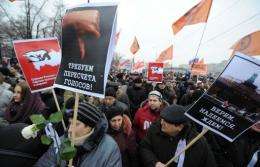Russia needs 'China-style' web controls: official

Russia needs Chinese-style government regulation of the Internet, a top official said Wednesday, after election protesters organised nationwide rallies through social networking sites.
"Attempts to stop people communicating are in principle counterproductive and even immoral. But we cannot ignore the use of the Internet by criminals and terrorist groups," Russia's Security Council chief Nikolai Patrushev said in an interview with Argumenty i Fakty newspaper.
"Of course there should be reasonable regulation in Russia, just as it is done in the United States, China and many other countries."
The Internet has become a vital resource in Russia to coordinate protests, including a rally that drew tens of thousands of people at the weekend disputing parliamentary polls won by Vladimir Putin's ruling party.
Rights activist Lev Ponomaryov linked Patrushev's proposal to the protests, warning a crackdown on the Internet would only provoke more public anger ahead of a new mass opposition rally planned this month.
"It's very significant that such proposals are being voiced after the mass rally in Moscow and ahead of another protest planned for December 24," Ponomaryov of For Human Rights movement told the Interfax news agency.

Restrictions on Internet freedoms would "provoke additional tensions in society," he said.
Russia in September became the European country with the largest number of Internet users, according to Comscore ratings agency, and the use of blogs and social networking sites has boomed in recent years.
Yet reflecting official fears, an FSB-backed campaign group called the Safe Internet League on Wednesday presented draft amendments to block sites with child pornography or promoting drugs and extremism.
The group's board of supervisors includes the FSB's head of information security, according to its website.
Experts said the problem was in defining terms such as 'extremism'.
"This is a threat to our individual liberties and a return to the Soviet Union. Our media is already censored. They should keep their hands off the Internet. Who decides what is extremist?" said popular blogger Alexander Plyushev.
Blocking websites deemed extremist "runs contrary to the Constitution, which bans censorship and guarantees the privacy of correspondence," said Irina Levova of the Russian Association of Electronic Communications.
There are already signs the authorities are blocking opposition websites. Independent media and an election monitor group have complained that their websites were subjected to hacker attacks ahead of the protests.
Experts also tracked streams of automatic messages posted on Twitter to trick people searching for information on rallies.
And the head of the VKontakte, Russia's most popular social networking site, wrote on his blog last week that prosecutors had called him in for questioning after he refused to deny access to a number of opposition groups.
China regulates the Internet by blocking websites it deems politically sensitive and last month backed stricter controls on social networking sites.
(c) 2011 AFP




















